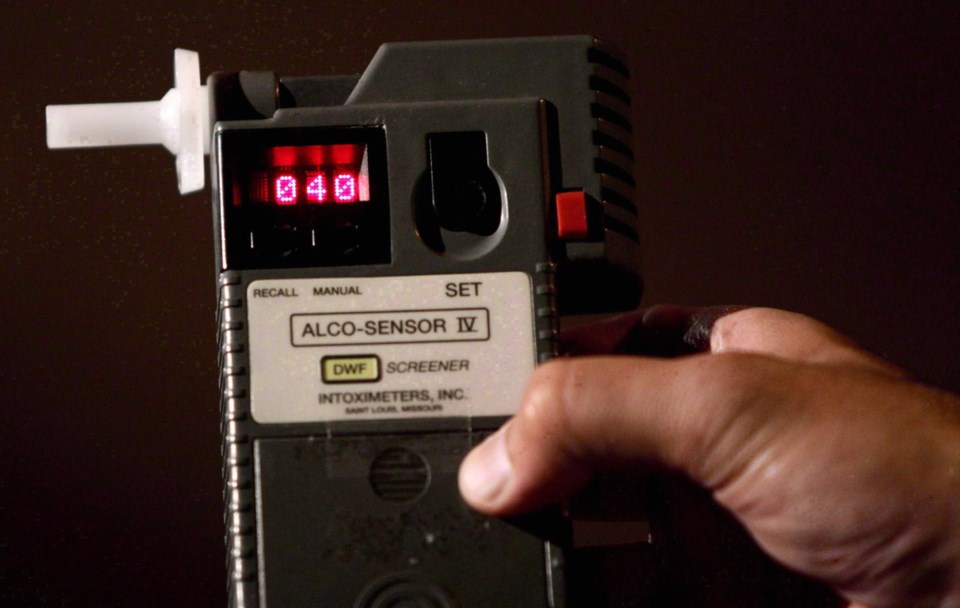Sweeping changes to Canada’s impaired-driving laws came into effect Tuesday, meaning police can demand a breath sample from any driver even if they don’t have probable cause to suspect the person was drinking.
Previously, a police officer had to have reasonable suspicion that drivers had alcohol in their system before demanding a roadside breath sample. That could include the smell of alcohol, signs of impairment or an admission that the driver had been drinking.
That changed Tuesday, when Bill C-46 became law. A driver who refuses to blow into a breathalyzer will face a criminal charge, with penalties similar to an impaired-driving conviction.
Staff Sgt. Ron Cronk, who heads the region’s Integrated Road Safety Unit, said the public needs to be educated about the new rules. “It’s part of the government’s responsibility to make that known that even though a driver knows they haven’t been drinking, if there’s been a lawful demand, they have to comply,” Cronk said.
Cronk said it’s too soon to tell how it will affect traffic police who will be setting up roadblocks across the region this month to nab impaired drivers through the CounterAttack program.
Cpl. Mike Halskov, spokesman for B.C. RCMP traffic services, said he hopes the new laws will allow officers to catch impaired drivers who previously slipped through the net.
“Studies have shown that even experienced police officers with training on how to detect impairment can miss the signs and symptoms. And this legislation is a way to bypass the human element,” he said.
Halskov acknowledged that it’s “improbable and impossible” to stop every driver at a roadblock and said officers will continue to use discretion and common sense.
It’s that discretion that concerns Josh Paterson, executive director of the B.C. Civil Liberties Association, who raised the possibility of racial profiling.
“We question how this will wind up affecting different people and communities. We already know that police disproportionately police and stop members of racialized and Indigenous [communities], on foot and in cars, across the country. With that lens in place, we are concerned about whether these new powers may be disproportionately used in certain neighbourhoods with higher concentrations of people of colour, with a discriminatory effect.”
Veteran Victoria lawyer Robert Mulligan echoed concerns about the possibility for discrimination when police decide who should be subject to a breath test.
“The concern is that this broadened power will facilitate potentially inequitable or discriminatory effects,” Mulligan said. “If you can make demands of anyone who is lawfully stopped, such as during a traffic investigation or a licence check, is it possible that this will result in minority groups or other disadvantaged people being disproportionately affected by criminal-code interventions of this kind?”
Halskov said police are only looking for impaired drivers. “Everyone else, no matter their ethnicity, their gender, it doesn’t matter.”
Both Cronk and Halskov said they anticipate legal challenges to the new law. “There’s always going to be challenges to new legislation,” Halskov said.
“This legislation affects every police force across the country, and the challenges, I’m sure, will be in every province and every jurisdiction. Right now, we just have to work with the laws the government has given us and we take a measured, reasonable approach to everything we do.”
Justice Minister Jody Wilson-Raybould said she has “every expectation” the new law will be challenged in the courts, but added she is confident it is consistent with the Charter of Rights and Freedoms.
The federal government made the change based on research that suggests up to 50 per cent of impaired drivers escape detection at roadside check stops.
Mandatory breath testing is allowed in 40 countries. In Ireland, mandatory roadside screening is credited with reducing the number of road deaths by 40 per cent in the first four years.
The new legislation also closes loopholes that sometimes allowed drivers to evade impaired-driving charges.
Under the previous law, drivers could argue they consumed alcohol just before or during driving and were not over the limit while driving because the alcohol was not fully absorbed. Drivers could also claim they left the scene of an accident and drank at home.
— With files from Louise Dickson and CP



